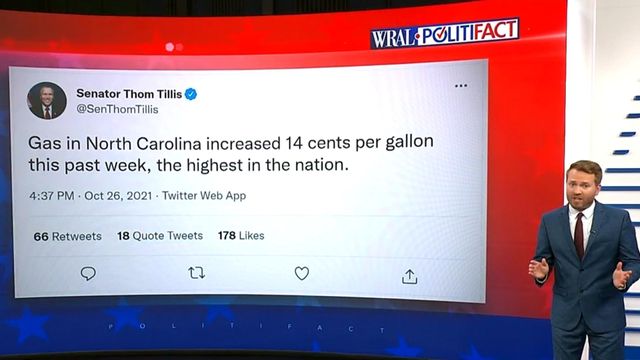Fact check: Tillis says NC's gas price hike was 'highest in the nation'
U.S. Sen. Thom Tillis (R-NC) tweeted on Oct. 26 that "gas in North Carolina increased 14 cents per gallon this past week, the highest in the nation." PolitiFact NC checks his claim.
Posted — UpdatedU.S. Sen. Thom Tillis says his state was recently the hardest-hit by rising gas prices.
“Gas in North Carolina increased 14 cents per gallon this past week, the highest in the nation,” Tillis tweeted on Oct. 26.
Because of the way Tillis’ tweet is phrased, it could be interpreted a couple ways. Did he mean North Carolina’s increase was the highest in the nation? Or that the state’s gas price was the highest in the nation?
A Tillis spokesperson told PolitiFact the senator’s tweet was meant to compare North Carolina’s price increase to those in other states. And he said it’s based on data from AAA, one of the largest vehicle and travel organizations in the country.
Experts told PolitiFact that North Carolina’s gas situation isn’t necessarily worse than other states. But Tillis’ tweet appears to accurately reflect price fluctuations over the previous seven days.
North Carolina’s hike
AAA singled out North Carolina and Florida as states that experienced the largest increase in gas prices, 14 cents.
Patrick De Haan, head of petroleum analysis for GasBuddy, said the average gas price in North Carolina rose 15 cents per gallon. While groups such as AAA capture accurate data, De Haan noted that the weekly snapshots can quickly become outdated.
“Gas prices fluctuate throughout the course of the day,” he said. “Just like the stock market constantly moves, gas prices constantly move.”
Thus, other snapshots can yield different results, De Haan said. For example, De Haan said GasBuddy data from Oct. 27 showed North Carolina with the 11th-largest price increase over the most recent seven days, and the third-largest increase over the previous month.
“Yes, over the last month North Carolina has seen one of the biggest increases in average prices. Basically everyone, North Carolina included, has seen a sharp uptick in prices,” De Haan said.
Why the surge?
“The cost of crude oil, a global commodity, accounts for more than 50% of the price at the pump,” Andrew Gross, AAA’s public relations manager, told PolitiFact NC in an email. He added that the Organization of the Petroleum Exporting Countries, known as OPEC, “still isn't producing at pre-pandemic levels, and it is leading to the higher cost.”
Why did North Carolina, of all states, have the largest price increase over the course of last week? The answer isn’t clear.
AAA didn’t identify a specific cause for North Carolina’s increase in its report or in emails with PolitiFact NC. A state’s proximity to a major fuel pipeline can play a role in a state’s gas prices, Gross said. “And with a shortage of drivers, gas stations may be accounting for higher transportation costs.”
Gross also noted that North Carolina still pays “quite a bit less” for gas than the average national price. North Carolinians on average paid $3.25 per gallon on Oct. 27, while the national average was $3.39 per gallon.
De Haan suggested states may simply be adjusting market conditions at different speeds. “Everyone is going to get to the same spot, some states are just going to get there faster,” he said.
Our ruling
Tillis tweeted that “gas in North Carolina increased 14 cents per gallon this past week, the highest in the nation.”
That appears to be accurate, according to AAA and GasBuddy data.
Experts clarified that North Carolina’s gas situation, overall, isn’t the worst in the country. They also warned that gas prices can change rapidly, so weekly snapshots may not always represent the latest fluctuations across the country.
The statement is accurate but could use additional information. We rate it Mostly True.
Related Topics
Copyright 2024 by Capitol Broadcasting Company. All rights reserved. This material may not be published, broadcast, rewritten or redistributed.





